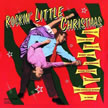 The doo-wop group Margo Sylvia and the Tune Weavers originally had a hit with "Happy Happy Birthday Baby" back about 1957 or so, and guess what? The phrase "Merry Merry Christmas Baby" had exactly the same cadence. According to the liner notes of Doo Wop Christmas on Rhino, Dodie Stevens recorded this Christmas variant of the song first in the early 1960s. If you liked it once, you'll love it with mistletoe. Margo was in the mood to try a comeback about 1988 or so and recorded the Christmas version herself, which is on the above-mentioned Rhino album, now out of print, as well as this one, which isn't. She died a few years later. There's also a "Happy Happy New Year Baby" by Jo Ann Campbell on Roulette from sometime in the 1960s.
The doo-wop group Margo Sylvia and the Tune Weavers originally had a hit with "Happy Happy Birthday Baby" back about 1957 or so, and guess what? The phrase "Merry Merry Christmas Baby" had exactly the same cadence. According to the liner notes of Doo Wop Christmas on Rhino, Dodie Stevens recorded this Christmas variant of the song first in the early 1960s. If you liked it once, you'll love it with mistletoe. Margo was in the mood to try a comeback about 1988 or so and recorded the Christmas version herself, which is on the above-mentioned Rhino album, now out of print, as well as this one, which isn't. She died a few years later. There's also a "Happy Happy New Year Baby" by Jo Ann Campbell on Roulette from sometime in the 1960s.
July 2008 Archives
 The doo-wop group Margo Sylvia and the Tune Weavers originally had a hit with "Happy Happy Birthday Baby" back about 1957 or so, and guess what? The phrase "Merry Merry Christmas Baby" had exactly the same cadence. According to the liner notes of Doo Wop Christmas on Rhino, Dodie Stevens recorded this Christmas variant of the song first in the early 1960s. If you liked it once, you'll love it with mistletoe. Margo was in the mood to try a comeback about 1988 or so and recorded the Christmas version herself, which is on the above-mentioned Rhino album, now out of print, as well as this one, which isn't. She died a few years later. There's also a "Happy Happy New Year Baby" by Jo Ann Campbell on Roulette from sometime in the 1960s.
The doo-wop group Margo Sylvia and the Tune Weavers originally had a hit with "Happy Happy Birthday Baby" back about 1957 or so, and guess what? The phrase "Merry Merry Christmas Baby" had exactly the same cadence. According to the liner notes of Doo Wop Christmas on Rhino, Dodie Stevens recorded this Christmas variant of the song first in the early 1960s. If you liked it once, you'll love it with mistletoe. Margo was in the mood to try a comeback about 1988 or so and recorded the Christmas version herself, which is on the above-mentioned Rhino album, now out of print, as well as this one, which isn't. She died a few years later. There's also a "Happy Happy New Year Baby" by Jo Ann Campbell on Roulette from sometime in the 1960s.
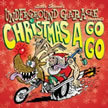 This actually is Seger's first shot at a Christmas song before he came forward with a fairly straightforward cover of "The Little Drummer Boy" for A Very Special Christmas. Two years before 1968's "Ramblin' Gamblin' Man" put him on the national charts, Seger did this Mitch Ryder-styled number for the holidays, a real classic stomper. Available sporadically on the odd compilation, most recently the Underground Garage holiday album shown here. Marshall Crenshaw's cover of this is note-perfect, by the way.
This actually is Seger's first shot at a Christmas song before he came forward with a fairly straightforward cover of "The Little Drummer Boy" for A Very Special Christmas. Two years before 1968's "Ramblin' Gamblin' Man" put him on the national charts, Seger did this Mitch Ryder-styled number for the holidays, a real classic stomper. Available sporadically on the odd compilation, most recently the Underground Garage holiday album shown here. Marshall Crenshaw's cover of this is note-perfect, by the way.
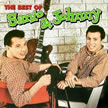 This pair of Brooklyn brothers, last name Farina, was best known for "Sleep Walk," the moody steel guitar-led instrumental that pops up on movie soundtracks occasionally. It was a big smash in its day, and the duo returned to the charts in 1960 with this record, a holiday take on the biggest dance craze of the year based on "Jingle Bells." They made several albums back in the day before splitting up, with Johnny continuing an independent solo musical career and maintaining the duo's official website. In fact, Johnny made a full solo holiday album in 2008 called Christmas Mine. Not surprisingly, it's an instrumental outing with lots of steel guitar, but no remake of the song this post is about.
This pair of Brooklyn brothers, last name Farina, was best known for "Sleep Walk," the moody steel guitar-led instrumental that pops up on movie soundtracks occasionally. It was a big smash in its day, and the duo returned to the charts in 1960 with this record, a holiday take on the biggest dance craze of the year based on "Jingle Bells." They made several albums back in the day before splitting up, with Johnny continuing an independent solo musical career and maintaining the duo's official website. In fact, Johnny made a full solo holiday album in 2008 called Christmas Mine. Not surprisingly, it's an instrumental outing with lots of steel guitar, but no remake of the song this post is about.
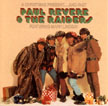 An early stab at a rock concept album, this 1966 vanity project was mostly written by Mark Lindsay and Terry Melcher, except for "Jingle Bells." It's fairly full of itself and horribly dated, as we learn from the very first (unlisted) cut, with a half-hearted Salvation Army band, smarmy narration and stupid schtick. "Wear a Smile at Christmas," the advertised first cut, is dopey and features a really bad Lyndon Johnson impression. The version of "Jingle Bells" doesn't even feature the band, but a couple of actors pretending to be half in the bag while singing the song. "Valley Forge" is just stupid, as is the Greensleeves cop "Brotherly Love." Some of the songs deeper into the album, like "Dear Mr. Claus" and "Macy's Window," are a little better, but the Salvation Army band preludes on most cuts get old quickly. And bail out before you get to "A Heavy Christmas Message," which is a hardly-heavy reason-for-the-season bromide. It's a real shame this isn't better, considering the band was such a rock 'n roll singles machine through the mid-Sixties.
An early stab at a rock concept album, this 1966 vanity project was mostly written by Mark Lindsay and Terry Melcher, except for "Jingle Bells." It's fairly full of itself and horribly dated, as we learn from the very first (unlisted) cut, with a half-hearted Salvation Army band, smarmy narration and stupid schtick. "Wear a Smile at Christmas," the advertised first cut, is dopey and features a really bad Lyndon Johnson impression. The version of "Jingle Bells" doesn't even feature the band, but a couple of actors pretending to be half in the bag while singing the song. "Valley Forge" is just stupid, as is the Greensleeves cop "Brotherly Love." Some of the songs deeper into the album, like "Dear Mr. Claus" and "Macy's Window," are a little better, but the Salvation Army band preludes on most cuts get old quickly. And bail out before you get to "A Heavy Christmas Message," which is a hardly-heavy reason-for-the-season bromide. It's a real shame this isn't better, considering the band was such a rock 'n roll singles machine through the mid-Sixties.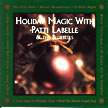 They say success has a thousand fathers while failure is an orphan. That's the story of this album in a nutshell. Patti's a well-known diva (and cook!) nowadays, but she hasn't sounded anything like this in oh, say 40 years -- her style has evolved and, naturally, her voice is a little darker with age. Thrown together on short notice and a tight budget, it's 10 traditional carols and holiday standards with standard mid-1960s arrangements, ponderous and unoriginal, that do nothing to bring out what was fun about that era's girl groups. Unless you're stuck in this particular era, this CD will probably get pretty old a couple of cuts in. It's instructive that I have so far had no success turning up anything about the history of this record, including its original release date. Meanwhile, this orphan will always manage to turn up in somebody's bargain bin at Christmas, thanks to cheap and neglected resale rights. UPDATE: Martin Johns, once again, checks in with some more info. "The Patti LaBelle & Bluebells album was originally released on Newtown Records in 1962 (as Sleigh Bells, Jingle Bells and Blue Bells), retitled and rereleased in 1971 on Trip... and on and on." Patti went on to cut more holiday music as a solo artist, offering This Christmas in 1996 and Miss Patti's Christmas in 2007.
They say success has a thousand fathers while failure is an orphan. That's the story of this album in a nutshell. Patti's a well-known diva (and cook!) nowadays, but she hasn't sounded anything like this in oh, say 40 years -- her style has evolved and, naturally, her voice is a little darker with age. Thrown together on short notice and a tight budget, it's 10 traditional carols and holiday standards with standard mid-1960s arrangements, ponderous and unoriginal, that do nothing to bring out what was fun about that era's girl groups. Unless you're stuck in this particular era, this CD will probably get pretty old a couple of cuts in. It's instructive that I have so far had no success turning up anything about the history of this record, including its original release date. Meanwhile, this orphan will always manage to turn up in somebody's bargain bin at Christmas, thanks to cheap and neglected resale rights. UPDATE: Martin Johns, once again, checks in with some more info. "The Patti LaBelle & Bluebells album was originally released on Newtown Records in 1962 (as Sleigh Bells, Jingle Bells and Blue Bells), retitled and rereleased in 1971 on Trip... and on and on." Patti went on to cut more holiday music as a solo artist, offering This Christmas in 1996 and Miss Patti's Christmas in 2007.
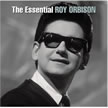 The Voice charted with this holiday tune in December 1963 that seems more country in retrospect; indeed, it's country folk who do covers of this Willie Nelson tune nowadays. Nevertheless, a must-hear at Christmas time if you're a fan of the other man in black. Roy Orbison never cut anything else Christmas-oriented as far as I can tell, and though this charted it didn't seem to loom large in his discography. But given the man's four-decade string of much bigger hits, that's not particularly surprising.
The Voice charted with this holiday tune in December 1963 that seems more country in retrospect; indeed, it's country folk who do covers of this Willie Nelson tune nowadays. Nevertheless, a must-hear at Christmas time if you're a fan of the other man in black. Roy Orbison never cut anything else Christmas-oriented as far as I can tell, and though this charted it didn't seem to loom large in his discography. But given the man's four-decade string of much bigger hits, that's not particularly surprising.
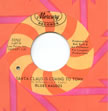 This may be a bootleg; my copy has no label information and a cheesy 2-color cover. But the Magoos, early garage psychedelic pioneers with one hit to their credit, "We Ain't Got Nothing Yet," take a fairly original tack to the arrangement of "Jingle Bells," revisiting it in a minor-key 60s blues-rock style. "Santa" is a short blues shuffle, and there's a third tune on this 45, "Dante's Inferno," which is not holiday-oriented and is about what you'd expect. Martin Johns writes in to assure us that "The Blues Magoos 45 was issued by Mercury in 1967 (catalog #72762)." So while my copy is most likely a bootleg, the record was officially released, with just the two holiday tunes. UPDATE: the band's single hit's title above was corrected as requested by Ken Froeschner. My fault for letting my fingers do the thinking. Thanks to Skip Groff for a scan of the original label.
This may be a bootleg; my copy has no label information and a cheesy 2-color cover. But the Magoos, early garage psychedelic pioneers with one hit to their credit, "We Ain't Got Nothing Yet," take a fairly original tack to the arrangement of "Jingle Bells," revisiting it in a minor-key 60s blues-rock style. "Santa" is a short blues shuffle, and there's a third tune on this 45, "Dante's Inferno," which is not holiday-oriented and is about what you'd expect. Martin Johns writes in to assure us that "The Blues Magoos 45 was issued by Mercury in 1967 (catalog #72762)." So while my copy is most likely a bootleg, the record was officially released, with just the two holiday tunes. UPDATE: the band's single hit's title above was corrected as requested by Ken Froeschner. My fault for letting my fingers do the thinking. Thanks to Skip Groff for a scan of the original label.
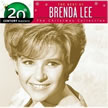 Boy, what a living Johnny Marks made off Christmas, between "Rudolph the Red-Nosed Reindeer," "Run Run Rudolph" and this song. Brenda Lee recorded this during the salad years of her career, and it's a classic for sure; so good, it made the charts in 1960, 1961 and 1962. Many people have covered this since then, but Brenda's version is tough to top. Flip side is "Papa Noel," if you can find a single of this; otherwise, it's been on a lot of compilation albums and CDs. Universal released a complete CD of all Brenda's Christmas songs in 1999, and it was reissued as a 20th Century Masters collection in 2003.
Boy, what a living Johnny Marks made off Christmas, between "Rudolph the Red-Nosed Reindeer," "Run Run Rudolph" and this song. Brenda Lee recorded this during the salad years of her career, and it's a classic for sure; so good, it made the charts in 1960, 1961 and 1962. Many people have covered this since then, but Brenda's version is tough to top. Flip side is "Papa Noel," if you can find a single of this; otherwise, it's been on a lot of compilation albums and CDs. Universal released a complete CD of all Brenda's Christmas songs in 1999, and it was reissued as a 20th Century Masters collection in 2003.
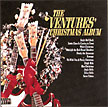 All you "Pulp Fiction" fans out there looking for a way to get medieval on the holiday need only hook up with this one, full of reverb- and vibrato-drenched guitar versions of favorite holiday classics like "Jingle Bells" and "Sleigh Ride." There's lots of genre-swapping here too, with "Jingle Bells" meeting "What'd I Say," a few bars of "Wooly Bully" kicking off "Santa Claus is Coming to Town," "Jingle Bell Rock" incorporating a little "Memphis" and "Rudolph the Red-Nosed Reindeer" riffing on "I Feel Fine." This instrumental combo imposes its trademark sound on everything it comes into contact with; I have other albums by them like The Ventures Play the Classics and The Ventures in Space. The group is still around and Big in Japan, and they took another crack at Christmas in 2002.
All you "Pulp Fiction" fans out there looking for a way to get medieval on the holiday need only hook up with this one, full of reverb- and vibrato-drenched guitar versions of favorite holiday classics like "Jingle Bells" and "Sleigh Ride." There's lots of genre-swapping here too, with "Jingle Bells" meeting "What'd I Say," a few bars of "Wooly Bully" kicking off "Santa Claus is Coming to Town," "Jingle Bell Rock" incorporating a little "Memphis" and "Rudolph the Red-Nosed Reindeer" riffing on "I Feel Fine." This instrumental combo imposes its trademark sound on everything it comes into contact with; I have other albums by them like The Ventures Play the Classics and The Ventures in Space. The group is still around and Big in Japan, and they took another crack at Christmas in 2002.
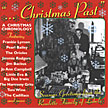 Another troll through the vaults, this one makes a point of noting it got this collection from the back room at the now-defunct Roulette Records. Some of these items are no surprise, as they've turned up on numerous collections. Others are a little more rare. Jim Backus of Mr. Magoo fame and Howard Morris, the once and future Ernest T. Bass, have novelty records here, Backus giving us "Why Don't You Go Home for Christmas," an anti-wife song, and Morris with both sides of his "Department Store Santa Claus" single. The Cadillacs' arrangement of "Rudolph the Red-Nosed Reindeer" is the one the Smithereens adapted for their version, the Marcels' "Merry Twist-Mas" is joined by a less-well known item, "Don't Cry for Me This Christmas," and Pearl Bailey and the Orioles contribute a pair of carols each. Little Eva joins with Big Dee Irwin for "I Wish You a Merry Christmas" and the Harmony Grits -- former members of the original Drifters -- do "Santa Claus is Coming to Town." The liner notes don't shrink from criticism; a Vietnam exploitation record by Derrick Roberts gets the note-writer's raspberry (deserved.) A pretty good collection for the oldies fan, with three New Year's songs, including Jo Ann Campbell's "Happy Happy New Year Baby," based on "Happy Happy Birthday Baby," not to mention "Merry Merry Christmas Baby." UPDATE: Yet another collection out of print and commanding high collector prices at this writing.
Another troll through the vaults, this one makes a point of noting it got this collection from the back room at the now-defunct Roulette Records. Some of these items are no surprise, as they've turned up on numerous collections. Others are a little more rare. Jim Backus of Mr. Magoo fame and Howard Morris, the once and future Ernest T. Bass, have novelty records here, Backus giving us "Why Don't You Go Home for Christmas," an anti-wife song, and Morris with both sides of his "Department Store Santa Claus" single. The Cadillacs' arrangement of "Rudolph the Red-Nosed Reindeer" is the one the Smithereens adapted for their version, the Marcels' "Merry Twist-Mas" is joined by a less-well known item, "Don't Cry for Me This Christmas," and Pearl Bailey and the Orioles contribute a pair of carols each. Little Eva joins with Big Dee Irwin for "I Wish You a Merry Christmas" and the Harmony Grits -- former members of the original Drifters -- do "Santa Claus is Coming to Town." The liner notes don't shrink from criticism; a Vietnam exploitation record by Derrick Roberts gets the note-writer's raspberry (deserved.) A pretty good collection for the oldies fan, with three New Year's songs, including Jo Ann Campbell's "Happy Happy New Year Baby," based on "Happy Happy Birthday Baby," not to mention "Merry Merry Christmas Baby." UPDATE: Yet another collection out of print and commanding high collector prices at this writing.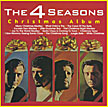 This group was caught in the middle between the doo-wop era and the beginning of the self-contained vocal/instrumental groups like the Beach Boys and the Beatles. This was no problem back in the day, as they rode a fairly long string of hit singles like "Sherry" and "Walk Like a Man" from the end of the Fifties through the mid-60s, then made a minor comeback in the disco era with "December 1963," not a holiday tune, though disco revivalists might quibble. Getting back to 1962, the original release of this album, the Seasons mostly succumbed to the pressure to treat the holiday with (too much) reverence, as seen elsewhere with Jackie Wilson and the Beach Boys. Like the Boys, the Seasons did a few tunes in their signature style and devoted the rest of the album to heavily orchestrated versions of traditional carols, including no less than four medleys. The Beach Boys, however, got a whole side of the vinyl LP for their original Christmas tunes; the Seasons only got two unique tunes on the whole album, both released as singles in their day, "Santa Claus Is Coming To Town" and "I Saw Mommy Kissing Santa Claus," both worthy of a holiday mix tape. The album was later issued as The 4 Seasons Christmas Album on Philips and Rhino, and is currently on offer from Curb/Warners. I should probably mention "Christmas Tears," the B-side of both singles, along with "The Christmas Song" and "White Christmas," as better examples of the Frankie Valli solo career, about which you can draw your own conclusions. UPDATE: I originally mentioned the version of "Jungle Bells" as a band original, but it turns out that song is a public domain kids' song about animals celebrating Christmas.
This group was caught in the middle between the doo-wop era and the beginning of the self-contained vocal/instrumental groups like the Beach Boys and the Beatles. This was no problem back in the day, as they rode a fairly long string of hit singles like "Sherry" and "Walk Like a Man" from the end of the Fifties through the mid-60s, then made a minor comeback in the disco era with "December 1963," not a holiday tune, though disco revivalists might quibble. Getting back to 1962, the original release of this album, the Seasons mostly succumbed to the pressure to treat the holiday with (too much) reverence, as seen elsewhere with Jackie Wilson and the Beach Boys. Like the Boys, the Seasons did a few tunes in their signature style and devoted the rest of the album to heavily orchestrated versions of traditional carols, including no less than four medleys. The Beach Boys, however, got a whole side of the vinyl LP for their original Christmas tunes; the Seasons only got two unique tunes on the whole album, both released as singles in their day, "Santa Claus Is Coming To Town" and "I Saw Mommy Kissing Santa Claus," both worthy of a holiday mix tape. The album was later issued as The 4 Seasons Christmas Album on Philips and Rhino, and is currently on offer from Curb/Warners. I should probably mention "Christmas Tears," the B-side of both singles, along with "The Christmas Song" and "White Christmas," as better examples of the Frankie Valli solo career, about which you can draw your own conclusions. UPDATE: I originally mentioned the version of "Jungle Bells" as a band original, but it turns out that song is a public domain kids' song about animals celebrating Christmas.
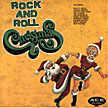 This album is a real puzzlement. I'm guessing it was originally assembled sometime in the 60s, as I've seen vinyl versions of this for years, and it made the transition to CD at some point. It turns out that most -- but not all -- of it is the seminal 1962 Christmas album by Huey "Piano" Smith and the Clowns, still a holiday rocker par excellence. All 10 tunes from that album are on here. There are six others, and I'm hoping someone will be able to fill in the gaps in the ensuing rundown. "Christmas Finds Me Oh So Sad" is definitely Charles Brown, as it was one side of a 1960 single on the associated Teem Records. It's similar to "Please Come Home For Christmas," as it's the same melody and chords but different words. Another version of "Merry Christmas Baby" was the A-side, and the version on here sounds like Brown, but the lyrics are all different and the piano player vamps bits of "Jingle Bells" between verses. (UPDATE: It's him, see below.) "Shimmy Winter Wonderland" by The Swingin' Embers is on here too, a 1961 single. "Rappin' Before Christmas," a great talk-through of the old "Night Before Christmas" story, is by just the Clowns. UPDATE: Brian Zimmerman got hold of the full track list from what he believes is a Japanese import, adding "Weary Silent Night" by Earl King (not on the American copy), "Please Come Home For Christmas" and "A Lonely Christmas" by Bob Wagner and "White Christmas Blue" by Johnny Meyers. UPDATE: A variation of this album is sold as A Southern Christmas. And no version of this album is currently in print, though copies trade fairly expensively when they do turn up.
This album is a real puzzlement. I'm guessing it was originally assembled sometime in the 60s, as I've seen vinyl versions of this for years, and it made the transition to CD at some point. It turns out that most -- but not all -- of it is the seminal 1962 Christmas album by Huey "Piano" Smith and the Clowns, still a holiday rocker par excellence. All 10 tunes from that album are on here. There are six others, and I'm hoping someone will be able to fill in the gaps in the ensuing rundown. "Christmas Finds Me Oh So Sad" is definitely Charles Brown, as it was one side of a 1960 single on the associated Teem Records. It's similar to "Please Come Home For Christmas," as it's the same melody and chords but different words. Another version of "Merry Christmas Baby" was the A-side, and the version on here sounds like Brown, but the lyrics are all different and the piano player vamps bits of "Jingle Bells" between verses. (UPDATE: It's him, see below.) "Shimmy Winter Wonderland" by The Swingin' Embers is on here too, a 1961 single. "Rappin' Before Christmas," a great talk-through of the old "Night Before Christmas" story, is by just the Clowns. UPDATE: Brian Zimmerman got hold of the full track list from what he believes is a Japanese import, adding "Weary Silent Night" by Earl King (not on the American copy), "Please Come Home For Christmas" and "A Lonely Christmas" by Bob Wagner and "White Christmas Blue" by Johnny Meyers. UPDATE: A variation of this album is sold as A Southern Christmas. And no version of this album is currently in print, though copies trade fairly expensively when they do turn up.
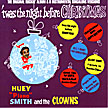 This seminal 1962 album on Ace Records is a serious party-down album of the Christmas variety; you can tell just by listening to their version of "Silent Night," on which most acts do too reverent a job. Ironically, this collector's item stacked up in warehouses on its initial issue in 1962, according to the liner notes, because of the inept distributorship of Vee-Jay Records, a firm that would later go on to fumble its brief ownership of The Beatles. But let's talk about Huey and the Clowns, who grafted bits of their earlier hits onto their holiday performances to ramp up the excitement level. Sounds cheesy, but modern acts might want to trot out that technique once in a while; it's at least good for laughs. The CD reissue includes instrumental-only versions of the tunes, so you can get down all year round! UPDATE: In the course of analyzing the track list for Ace Records' A Rock 'n Roll Christmas, which is an alternate version of this album with additional songs by other artists, Brian Zimmerman discovered there were a fair number of guest artists on this album. The Heartbeats join the Clowns on "Jingle Bells" and "Almost Time for Santa," Jessie Thomas is on "Silent Night," "Doing the Santa Claus," "Twas the Night Before Christmas" and "All I Want for Christmas," and Bubba Anderson is on "Rock 'n Roll Santa Claus." Long out of print, Westside Records reissued the album on CD several years ago, and that too is no longer available.
This seminal 1962 album on Ace Records is a serious party-down album of the Christmas variety; you can tell just by listening to their version of "Silent Night," on which most acts do too reverent a job. Ironically, this collector's item stacked up in warehouses on its initial issue in 1962, according to the liner notes, because of the inept distributorship of Vee-Jay Records, a firm that would later go on to fumble its brief ownership of The Beatles. But let's talk about Huey and the Clowns, who grafted bits of their earlier hits onto their holiday performances to ramp up the excitement level. Sounds cheesy, but modern acts might want to trot out that technique once in a while; it's at least good for laughs. The CD reissue includes instrumental-only versions of the tunes, so you can get down all year round! UPDATE: In the course of analyzing the track list for Ace Records' A Rock 'n Roll Christmas, which is an alternate version of this album with additional songs by other artists, Brian Zimmerman discovered there were a fair number of guest artists on this album. The Heartbeats join the Clowns on "Jingle Bells" and "Almost Time for Santa," Jessie Thomas is on "Silent Night," "Doing the Santa Claus," "Twas the Night Before Christmas" and "All I Want for Christmas," and Bubba Anderson is on "Rock 'n Roll Santa Claus." Long out of print, Westside Records reissued the album on CD several years ago, and that too is no longer available.
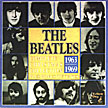 Needless to say, this is a bootleg of all those annual flexidisk recordings the Beatles made for their various fan clubs. There once was a legitimate Apple release, The Beatles Christmas Album, which was out only for a brief time in 1970 and, needless to say, commands high prices nowadays. For the purposes of this site, I must point out that these recordings are only peripherally connected to Christmas; the holiday references could be excised from several of them with very little effort. The fact that they aren't generally available now is what makes them such a Holy Grail for Beatles collectors. If you're not a major fan, they don't make such great listening. For those of us who care, however, these examples of Beatle buffoonery serve as road markers for the various stages of their career -- lots of thank-yous for buying records in the earlier ones, "Goon Show"-inspired attempts at radio drama in the middle period ones, visits from Yoko and plugs for their solo projects in the later ones. There's a standalone version of "Christmastime Is Here Again," longer than the one on the "Free as a Bird" single, and an outtake from the 1964 recording on this particular collection. Having finally listened to the whole batch all the way through, it's quite evident why the surviving Beatles haven't made any effort to release these to the general public; they resemble nothing so much as home movies.
Needless to say, this is a bootleg of all those annual flexidisk recordings the Beatles made for their various fan clubs. There once was a legitimate Apple release, The Beatles Christmas Album, which was out only for a brief time in 1970 and, needless to say, commands high prices nowadays. For the purposes of this site, I must point out that these recordings are only peripherally connected to Christmas; the holiday references could be excised from several of them with very little effort. The fact that they aren't generally available now is what makes them such a Holy Grail for Beatles collectors. If you're not a major fan, they don't make such great listening. For those of us who care, however, these examples of Beatle buffoonery serve as road markers for the various stages of their career -- lots of thank-yous for buying records in the earlier ones, "Goon Show"-inspired attempts at radio drama in the middle period ones, visits from Yoko and plugs for their solo projects in the later ones. There's a standalone version of "Christmastime Is Here Again," longer than the one on the "Free as a Bird" single, and an outtake from the 1964 recording on this particular collection. Having finally listened to the whole batch all the way through, it's quite evident why the surviving Beatles haven't made any effort to release these to the general public; they resemble nothing so much as home movies.
 Phil Spector notwithstanding, John Lennon had a few years of practice doing Christmas records himself with his fellow Beatles before he got around to doing "Happy Xmas (War is Over)." Those records, however, were only ever released as acetates to fan club members, or bootlegged, except for a briefly issued album in 1970. This partial song was used as a motif for one of the later Christmas records and was released on the 1994 CD/vinyl single of "Free as a Bird." Despite its incomplete state, many bands have covered it -- even Ringo did a version on his Christmas album. A proper release of the Beatles' series of Christmas records has been an oft-rumored possibility for the past 35 years, but the prospect remains remote. As in the case of Elvis, the Beatles spawned a number of cash-in novelty records; Christmas-oriented ones cited by Dave Marsh and Steve Propes' book Merry Christmas Baby include "Ringo Bells" by the Three Blonde Mice, "All I Want for Christmas Is a Beatle" by Dora Bryan, "Christmas with the Beatles" by Judy and the Duets and "I Want the Beatles for Christmas" by Jackie and Jill. That's just the holiday ones, of course; such folks as Sissy Spacek and Cher recorded non-holiday ones as well.
Phil Spector notwithstanding, John Lennon had a few years of practice doing Christmas records himself with his fellow Beatles before he got around to doing "Happy Xmas (War is Over)." Those records, however, were only ever released as acetates to fan club members, or bootlegged, except for a briefly issued album in 1970. This partial song was used as a motif for one of the later Christmas records and was released on the 1994 CD/vinyl single of "Free as a Bird." Despite its incomplete state, many bands have covered it -- even Ringo did a version on his Christmas album. A proper release of the Beatles' series of Christmas records has been an oft-rumored possibility for the past 35 years, but the prospect remains remote. As in the case of Elvis, the Beatles spawned a number of cash-in novelty records; Christmas-oriented ones cited by Dave Marsh and Steve Propes' book Merry Christmas Baby include "Ringo Bells" by the Three Blonde Mice, "All I Want for Christmas Is a Beatle" by Dora Bryan, "Christmas with the Beatles" by Judy and the Duets and "I Want the Beatles for Christmas" by Jackie and Jill. That's just the holiday ones, of course; such folks as Sissy Spacek and Cher recorded non-holiday ones as well.
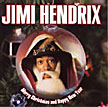 The guitar giant's rendition of "Little Drummer Boy," long unavailable except on promos and bootlegs, sneaked out in 1999 on a CD single that gives us two versions of the 1969 rehearsal tape, a concise one and a more rambling version. This is the Band of Gypsies doing a medley of "Drummer" with "Silent Night" and "Auld Lang Syne." It's strictly instrumental, but it's so recognizable that you'll want to throw it on your mix tapes. Also on hand is the long-forgotten "Three Little Bears," done with the Experience. Good liner notes and a friendly purchase price combine for a nice cheap Christmas gift.
The guitar giant's rendition of "Little Drummer Boy," long unavailable except on promos and bootlegs, sneaked out in 1999 on a CD single that gives us two versions of the 1969 rehearsal tape, a concise one and a more rambling version. This is the Band of Gypsies doing a medley of "Drummer" with "Silent Night" and "Auld Lang Syne." It's strictly instrumental, but it's so recognizable that you'll want to throw it on your mix tapes. Also on hand is the long-forgotten "Three Little Bears," done with the Experience. Good liner notes and a friendly purchase price combine for a nice cheap Christmas gift.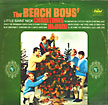 The original 1964 album by this seminal American rock 'n roll band is kind of a schizophrenic affair. The first five tunes are Beach Boys originals with their trademark 60s sound, including "Little Saint Nick," then the rest of the album is period-pop Christmas standards with arrangements straight out of the Four Freshmen songbook (arranged by Dick Reynolds, a veteran of that group's recordings) and backed by a 40-piece orchestra (cocktail alert!). The original CD version adds several outtakes, including two alternate versions of "Little Saint Nick." The Boys attempted to match Elvis in recording a second unique Christmas album in 1977, but that project was shelved, with only the 1974 single "Child of WInter" finding its way to the public via Brother Records. The best tracks from that later effort were eventually combined with the 1964 album for a 1998 CD titled Ultimate Christmas. Several of those later songs were simple retoolings of existing Beach Boys tracks from the "Brian's Back" period, a little clumsy lyrically but still possessing the trademark sound. They even managed to do a song called "Melekalikimaka" that is no relation to the better known Christmas in Hawaii song. Some toy drive promos and a canned interview with Brian distributed to promote the original Christmas album round out this package. UPDATE: For 2004, Ultimate was reissued as Christmas With the Beach Boys, minus one cut, "Christmas Time Is Here Again." That album is the only one that remains in print, except for 2009's Christmas Harmonies, which just has 15 cuts from the 25-song 2004 album, including mono mixes of the 1964 songs.
The original 1964 album by this seminal American rock 'n roll band is kind of a schizophrenic affair. The first five tunes are Beach Boys originals with their trademark 60s sound, including "Little Saint Nick," then the rest of the album is period-pop Christmas standards with arrangements straight out of the Four Freshmen songbook (arranged by Dick Reynolds, a veteran of that group's recordings) and backed by a 40-piece orchestra (cocktail alert!). The original CD version adds several outtakes, including two alternate versions of "Little Saint Nick." The Boys attempted to match Elvis in recording a second unique Christmas album in 1977, but that project was shelved, with only the 1974 single "Child of WInter" finding its way to the public via Brother Records. The best tracks from that later effort were eventually combined with the 1964 album for a 1998 CD titled Ultimate Christmas. Several of those later songs were simple retoolings of existing Beach Boys tracks from the "Brian's Back" period, a little clumsy lyrically but still possessing the trademark sound. They even managed to do a song called "Melekalikimaka" that is no relation to the better known Christmas in Hawaii song. Some toy drive promos and a canned interview with Brian distributed to promote the original Christmas album round out this package. UPDATE: For 2004, Ultimate was reissued as Christmas With the Beach Boys, minus one cut, "Christmas Time Is Here Again." That album is the only one that remains in print, except for 2009's Christmas Harmonies, which just has 15 cuts from the 25-song 2004 album, including mono mixes of the 1964 songs.
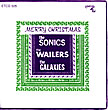 Thirty years before Nirvana and the other Seattle groups of the late 80s-early 90s, there was a thriving Northwest rock scene featuring these three groups and a number of others; in fact, there is a case to be made that the 60s Northwest bands were among the earliest practitioners of Nuggets-era punk rock. The Sonics' "Don't Believe in Christmas" and the Wailers' "Christmas Spirit??" are especially sardonic takes on the holiday, and all the tunes but "Please Come Home for Christmas" and "The Christmas Song" are originals. As the liner notes say, "The songs ... may appear to be normal Christmas tunes -- WE DON'T PLAY THAT." A classic rock Christmas album along the lines of Phil Spector's, but overlooked for three decades; miraculously, it was issued on CD in 1991, but it went out of print yet again and sells for collector's prices when it does turn up. A 1965 single of The Sonics' "Don't Believe in Christmas" and The Wailers' "Christmas Spirit??" was issued on Etiquette. UPDATE: Don't overlook the Galaxies, as they have reunited.
Thirty years before Nirvana and the other Seattle groups of the late 80s-early 90s, there was a thriving Northwest rock scene featuring these three groups and a number of others; in fact, there is a case to be made that the 60s Northwest bands were among the earliest practitioners of Nuggets-era punk rock. The Sonics' "Don't Believe in Christmas" and the Wailers' "Christmas Spirit??" are especially sardonic takes on the holiday, and all the tunes but "Please Come Home for Christmas" and "The Christmas Song" are originals. As the liner notes say, "The songs ... may appear to be normal Christmas tunes -- WE DON'T PLAY THAT." A classic rock Christmas album along the lines of Phil Spector's, but overlooked for three decades; miraculously, it was issued on CD in 1991, but it went out of print yet again and sells for collector's prices when it does turn up. A 1965 single of The Sonics' "Don't Believe in Christmas" and The Wailers' "Christmas Spirit??" was issued on Etiquette. UPDATE: Don't overlook the Galaxies, as they have reunited.
 The absolute and utter ground zero of all rock 'n roll Christmas records. People my age tend to know this instinctively, but younger folks may need some convincing. The overall sound is of late 50s to early 60s R&B, and today's youth tends to believe that sound is cornball. But the Spector wall of sound is one of the most important antecedents of modern rock and pop music, and when it comes to Christmas, a little cornball goes a long way. Phil really threw himself into this one, adding various holiday-oriented percussion to his patented sound, and turning loose some great re-thinks of evergreen Christmas songs, along with the perfect original "Christmas (Baby Please Come Home)." There are few rock or pop acts whose arrangement of "Santa Claus Is Coming To Town" isn't a straight rip of Phil's, whether Bruce Springsteen or the Pointer Sisters. Originally released in 1963 -- the same month as the Kennedy assassination -- and re-released on a number of different labels since, and still a mandatory part of any rockin' Christmas. UPDATE: Though most folks refer to this as a Phil Spector album because of his dictatorial control of the content, it's technically a "various artists" album featuring Philles Records acts The Crystals, the Ronettes, Darlene Love, and Bob B. Soxx and the Blue Jeans. The first reissue came about 1972 on Apple Records through Phil's involvement with the Beatles, then later on Pavilion and Abkco, and in 1987 Chrysalis released "The Phil Spector Christmas Mix," which segued four songs together without breaks in the dance music style of the time; think "Stars on 45." UPDATE: Accused in the 2003 shooting of starlet Patricia Clarkson at his home, Spector was convicted in 2009 after a 2007 mistrial and is serving 19 years to life in prison.
The absolute and utter ground zero of all rock 'n roll Christmas records. People my age tend to know this instinctively, but younger folks may need some convincing. The overall sound is of late 50s to early 60s R&B, and today's youth tends to believe that sound is cornball. But the Spector wall of sound is one of the most important antecedents of modern rock and pop music, and when it comes to Christmas, a little cornball goes a long way. Phil really threw himself into this one, adding various holiday-oriented percussion to his patented sound, and turning loose some great re-thinks of evergreen Christmas songs, along with the perfect original "Christmas (Baby Please Come Home)." There are few rock or pop acts whose arrangement of "Santa Claus Is Coming To Town" isn't a straight rip of Phil's, whether Bruce Springsteen or the Pointer Sisters. Originally released in 1963 -- the same month as the Kennedy assassination -- and re-released on a number of different labels since, and still a mandatory part of any rockin' Christmas. UPDATE: Though most folks refer to this as a Phil Spector album because of his dictatorial control of the content, it's technically a "various artists" album featuring Philles Records acts The Crystals, the Ronettes, Darlene Love, and Bob B. Soxx and the Blue Jeans. The first reissue came about 1972 on Apple Records through Phil's involvement with the Beatles, then later on Pavilion and Abkco, and in 1987 Chrysalis released "The Phil Spector Christmas Mix," which segued four songs together without breaks in the dance music style of the time; think "Stars on 45." UPDATE: Accused in the 2003 shooting of starlet Patricia Clarkson at his home, Spector was convicted in 2009 after a 2007 mistrial and is serving 19 years to life in prison.
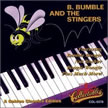 Since "The Nutcracker Suite" has become such a big part of the Christmas season, it's only right that this rock 'n roll version of it take its rightful place in the rockin' Christmas pantheon. This February 1962 hit was the second followup to the band's April 1961 hit "Bumble Boogie," a rock rethink of "The Flight of the Bumblebee." And yes, the bandleader's name was William Bumble, alias Bill, although on "Nut Rocker" he had a little help from one Kim Fowley. Emerson Lake and Palmer did a cover of it as the encore to its album-length performance of Pictures at an Exhibition in 1973, and to prove turnabout is fair play, there's a full orchestra version knocking around by the Portsmouth Sinfonia, the little symphony that couldn't. There's a detailed history about "Nut Rocker" by Al Hasan, one of the musicians who played on the record, at Spectropop.com.
Since "The Nutcracker Suite" has become such a big part of the Christmas season, it's only right that this rock 'n roll version of it take its rightful place in the rockin' Christmas pantheon. This February 1962 hit was the second followup to the band's April 1961 hit "Bumble Boogie," a rock rethink of "The Flight of the Bumblebee." And yes, the bandleader's name was William Bumble, alias Bill, although on "Nut Rocker" he had a little help from one Kim Fowley. Emerson Lake and Palmer did a cover of it as the encore to its album-length performance of Pictures at an Exhibition in 1973, and to prove turnabout is fair play, there's a full orchestra version knocking around by the Portsmouth Sinfonia, the little symphony that couldn't. There's a detailed history about "Nut Rocker" by Al Hasan, one of the musicians who played on the record, at Spectropop.com.
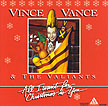 From the cover, you're likely to get the idea this 1995 album is some kind of rockabilly Christmas deal, but you'll be disappointed. It's got a 1950s vibe all right, but a "Happy Days"-inspired one, as you might expect from a show band whose leader "travels with 50 costume changes," as listed on the website. Some of these tunes, like "A Christmas Wish" and "Merry Christmas to You," are just flat-out lounge music, "Winter Wonderland" is strictly from Lawrence Welk land, and the obligatory kids-singing number "Can't Wait Till Christmas Day" is about what you'd expect. "White Christmas" gets a nice "Blueberry Hill" arrangement, and "Christmas Just Ain't Christmas Without You" is a serviceable blues ballad, although the synth horns hurt it, and "I Wish I Was a Christmas Tree" is a half-decent novelty tune. The disc has its moments, but nothing to top the old masters from the early days of rock 'n roll.
From the cover, you're likely to get the idea this 1995 album is some kind of rockabilly Christmas deal, but you'll be disappointed. It's got a 1950s vibe all right, but a "Happy Days"-inspired one, as you might expect from a show band whose leader "travels with 50 costume changes," as listed on the website. Some of these tunes, like "A Christmas Wish" and "Merry Christmas to You," are just flat-out lounge music, "Winter Wonderland" is strictly from Lawrence Welk land, and the obligatory kids-singing number "Can't Wait Till Christmas Day" is about what you'd expect. "White Christmas" gets a nice "Blueberry Hill" arrangement, and "Christmas Just Ain't Christmas Without You" is a serviceable blues ballad, although the synth horns hurt it, and "I Wish I Was a Christmas Tree" is a half-decent novelty tune. The disc has its moments, but nothing to top the old masters from the early days of rock 'n roll.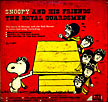 This group hit three times in 1966 with songs based on Charles Schulz's comic strip dog Snoopy and his imaginary exploits battling the Red Baron over the skies of Europe, then disappeared off the face of the earth. Still, they managed to fuse their three hits into a kind of half concept album, with spoken word radio show interludes linking "Snoopy vs the Red Baron" and "Return of the Red Baron" to the climactic "Snoopy's Christmas." It's way too silly for words, but if your children are familiar with the Peanuts strip, they might get a bang out of this. There's also a non-Snoopy Christmas song on side 2, "It Kinda Looks Like Christmas." It's been reissued under various different titles in the CD era, so you should still be able to snap up a copy.
This group hit three times in 1966 with songs based on Charles Schulz's comic strip dog Snoopy and his imaginary exploits battling the Red Baron over the skies of Europe, then disappeared off the face of the earth. Still, they managed to fuse their three hits into a kind of half concept album, with spoken word radio show interludes linking "Snoopy vs the Red Baron" and "Return of the Red Baron" to the climactic "Snoopy's Christmas." It's way too silly for words, but if your children are familiar with the Peanuts strip, they might get a bang out of this. There's also a non-Snoopy Christmas song on side 2, "It Kinda Looks Like Christmas." It's been reissued under various different titles in the CD era, so you should still be able to snap up a copy.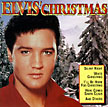 A pop music sub-genre called the "cash-in record," this takes place when a musical star becomes so famous that other people (read: record companies) feel obliged to perform songs about him or her. Elvis certainly falls into this category, wherein results this record, also performed by Debbie Dabney and co-written by Bobby Darin. Other examples include "I Want to Spend Xmas With Elvis" by Marlene Paul (UPDATE: this appears to be the exact same record as Debbie Dabney, based on the samples I was able to scare up from various sources) and "Elvis For Christmas" by Mad Milo, a Buchanan-Goodman styled novelty record. Note that these are just the Christmas-oriented Elvis cash-ins; there were plenty of others not related to the holiday, like "My Boy Elvis" by Janis Martin.
A pop music sub-genre called the "cash-in record," this takes place when a musical star becomes so famous that other people (read: record companies) feel obliged to perform songs about him or her. Elvis certainly falls into this category, wherein results this record, also performed by Debbie Dabney and co-written by Bobby Darin. Other examples include "I Want to Spend Xmas With Elvis" by Marlene Paul (UPDATE: this appears to be the exact same record as Debbie Dabney, based on the samples I was able to scare up from various sources) and "Elvis For Christmas" by Mad Milo, a Buchanan-Goodman styled novelty record. Note that these are just the Christmas-oriented Elvis cash-ins; there were plenty of others not related to the holiday, like "My Boy Elvis" by Janis Martin.
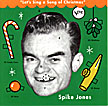 You might think that a musical genius like Spike Jones would be secure in his vision, but this 1956 album, reissued for the first time in 1998, exposes the man's inner conflicts. He and his City Slickers were famous for novelty music with wild stage antics that required tight discipline and musicianship, a pre-rock predecessor to Frank Zappa or the Tubes. But Jones' humorous music was constantly dogged by critics. As a result, he occasionally attempted to present more straight-faced fare, which turned out to be indistinguishable from the offerings of such as Lawrence Welk and which comprise the bulk of this Christmas album. Oh, there are some good novelties, like "Santa Claus's Son," "Nuttin' For Christmas," and the popular "All I Want for Christmas is My Two Front Teeth," and he buries an entertaining "Jingle Bells" in pig Latin inside an otherwise unremarkable medley. But most of the novelty stuff depends on trumpeter George Rock's bad-little-boy voice to carry the performance; a typical City Slickers outing had a much wider cast of characters. All in all, one of history's lost opportunities. UPDATE: Rhino had a reissue of this album out in the mid-1980s (I knew that, but forgot). Thanks to Chris Candreva for the reminder. He also notes that Billy May, arranger on this album, worked with Stan Freberg (see above) and also did the Carpenters' Christmas album -- Rich and Karen apparently were fans of the Spike Jones album. FURTHER UPDATE: Ted Hering tells us that Billy May wasn't involved with this album -- Jud Conlan was the arranger. Sure enough, Conlan, and the Jud Conlan Singers, are listed in the credits of the album. Conlan is credited with vocal arranging on every cut. And Richard Carpenter did liner notes for the reissue. Somehow, in those liner notes, I previously missed the fact that Spike also cut a version of "The Nutcracker Suite" in 1945, reissued as Christmas Crackers.
You might think that a musical genius like Spike Jones would be secure in his vision, but this 1956 album, reissued for the first time in 1998, exposes the man's inner conflicts. He and his City Slickers were famous for novelty music with wild stage antics that required tight discipline and musicianship, a pre-rock predecessor to Frank Zappa or the Tubes. But Jones' humorous music was constantly dogged by critics. As a result, he occasionally attempted to present more straight-faced fare, which turned out to be indistinguishable from the offerings of such as Lawrence Welk and which comprise the bulk of this Christmas album. Oh, there are some good novelties, like "Santa Claus's Son," "Nuttin' For Christmas," and the popular "All I Want for Christmas is My Two Front Teeth," and he buries an entertaining "Jingle Bells" in pig Latin inside an otherwise unremarkable medley. But most of the novelty stuff depends on trumpeter George Rock's bad-little-boy voice to carry the performance; a typical City Slickers outing had a much wider cast of characters. All in all, one of history's lost opportunities. UPDATE: Rhino had a reissue of this album out in the mid-1980s (I knew that, but forgot). Thanks to Chris Candreva for the reminder. He also notes that Billy May, arranger on this album, worked with Stan Freberg (see above) and also did the Carpenters' Christmas album -- Rich and Karen apparently were fans of the Spike Jones album. FURTHER UPDATE: Ted Hering tells us that Billy May wasn't involved with this album -- Jud Conlan was the arranger. Sure enough, Conlan, and the Jud Conlan Singers, are listed in the credits of the album. Conlan is credited with vocal arranging on every cut. And Richard Carpenter did liner notes for the reissue. Somehow, in those liner notes, I previously missed the fact that Spike also cut a version of "The Nutcracker Suite" in 1945, reissued as Christmas Crackers.
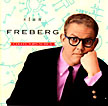 Stan belongs in the Christmas records' hall of fame for his Christmas novelty records of the 1950s. "Christmas Dragnet," a parody of the TV cop show, is from 1953 and itself was a sequel to Freberg's "St. George and the Dragonet," another Dragnet parody based on the legend of St. George and the Dragon. Freberg struck again with "Nuttin' For Christmas," and in 1958 took a funny and effective stab at social commentary with "Green Christmas," in which Bob Cratchit, owner of a spice shop in Orange, N.J., turns down advertising advice from Scrooge, here presented as chairman of the board of Scrooge Chiat Day, or some such high-powered New York ad agency. UPDATE: Fred Clemons corrects the release date of "Green Christmas" and notes that "Christmas Dragnet" was re-released as "Yulenet" in 1954, though it remains the same recording. End update. As for "Nuttin' For Christmas," Freberg hit the charts with this in December 1955 -- and so did the Fontaine Sisters and Barry Gordon, a seldom-equaled blitz of versions of a single song. The bad-litttle-boy riff makes this song a Christmas novelty staple, although Freberg's version throws in colloboration with an actual burglar at the end, making this version darker than the others, and need I add, funnier. UPDATE: Bob Bailey notes there were actually five charting versions of this song that year; the other artists were Joe Ward and Ricky Zahnd, the latter of whom went on to serve as vice president of the New York Knicks and the Rangers. I'm guessing the latter two's success was much more limited, since other sources I consulted didn't turn up their names.
Stan belongs in the Christmas records' hall of fame for his Christmas novelty records of the 1950s. "Christmas Dragnet," a parody of the TV cop show, is from 1953 and itself was a sequel to Freberg's "St. George and the Dragonet," another Dragnet parody based on the legend of St. George and the Dragon. Freberg struck again with "Nuttin' For Christmas," and in 1958 took a funny and effective stab at social commentary with "Green Christmas," in which Bob Cratchit, owner of a spice shop in Orange, N.J., turns down advertising advice from Scrooge, here presented as chairman of the board of Scrooge Chiat Day, or some such high-powered New York ad agency. UPDATE: Fred Clemons corrects the release date of "Green Christmas" and notes that "Christmas Dragnet" was re-released as "Yulenet" in 1954, though it remains the same recording. End update. As for "Nuttin' For Christmas," Freberg hit the charts with this in December 1955 -- and so did the Fontaine Sisters and Barry Gordon, a seldom-equaled blitz of versions of a single song. The bad-litttle-boy riff makes this song a Christmas novelty staple, although Freberg's version throws in colloboration with an actual burglar at the end, making this version darker than the others, and need I add, funnier. UPDATE: Bob Bailey notes there were actually five charting versions of this song that year; the other artists were Joe Ward and Ricky Zahnd, the latter of whom went on to serve as vice president of the New York Knicks and the Rangers. I'm guessing the latter two's success was much more limited, since other sources I consulted didn't turn up their names.
 Great song titles aren't all that common, more's the pity, but here's one that's just top-notch. Gayla Peevey, according to legend, was a regional child star of the Oklahoma City area, and this 1953 hit was recorded as a fund-raiser to bring the city zoo a hippo. The song raised $3,000 and the hippo was procured. Unfortunately, Matilda, the hippo, was scheduled to be transferred to Walt Disney World but died instead in March 1998. The song is campy as all get-out, but it never fails to raise eyebrows and perk up ears upon first hearing. It's on the first Dr. Demento compilation. Gayla Peevey herself writes in to add: "The record was released nationally by Columbia Records and because the Oklahoma City Zoo needed a hippo at the time, the song gave them the idea of putting together a major media blitz asking kids to send in nickels and dimes to raise money to buy Gayla a hippopotamus for Christmas. Matilda, a baby hippo, was presented to me, and I donated her to the zoo. In a roundabout way the song indeed helped the zoo aquire a hippo, but the song was not recorded for that purpose." Thanks, Gayla! UPDATE: The B-side of the original single was "Are My Ears On Straight," about a baby doll getting fixed up to be given as a Christmas gift. That tune seems to have disappeared off the face of the earth, however. Nor can I find a source for Gayla's later single with Mitch Miller, "The Angel On the Christmas Tree" backed with "Got a Cold In My Node For Christmas." And John Alfano writes in to tell us Gayla changed her name to Jamie Horton as a teenager when she recorded for Joy Records, where she had a hit with "My Little Marine." No mention of any further Christmas tunes, however.
Great song titles aren't all that common, more's the pity, but here's one that's just top-notch. Gayla Peevey, according to legend, was a regional child star of the Oklahoma City area, and this 1953 hit was recorded as a fund-raiser to bring the city zoo a hippo. The song raised $3,000 and the hippo was procured. Unfortunately, Matilda, the hippo, was scheduled to be transferred to Walt Disney World but died instead in March 1998. The song is campy as all get-out, but it never fails to raise eyebrows and perk up ears upon first hearing. It's on the first Dr. Demento compilation. Gayla Peevey herself writes in to add: "The record was released nationally by Columbia Records and because the Oklahoma City Zoo needed a hippo at the time, the song gave them the idea of putting together a major media blitz asking kids to send in nickels and dimes to raise money to buy Gayla a hippopotamus for Christmas. Matilda, a baby hippo, was presented to me, and I donated her to the zoo. In a roundabout way the song indeed helped the zoo aquire a hippo, but the song was not recorded for that purpose." Thanks, Gayla! UPDATE: The B-side of the original single was "Are My Ears On Straight," about a baby doll getting fixed up to be given as a Christmas gift. That tune seems to have disappeared off the face of the earth, however. Nor can I find a source for Gayla's later single with Mitch Miller, "The Angel On the Christmas Tree" backed with "Got a Cold In My Node For Christmas." And John Alfano writes in to tell us Gayla changed her name to Jamie Horton as a teenager when she recorded for Joy Records, where she had a hit with "My Little Marine." No mention of any further Christmas tunes, however.
 Not a song at all per se, it's a novelty record in which Santa meets up with a UFO, and the whole thing is reported on the news by "John Cameron Cameron," parodying longtime broadcast announcer John Cameron Swayze. And if that's not enough, when the record goes into question-and-answer format, JCC's questions are answered with actual snippets from rock songs, something we now call sampling. The "satellite" was a play on the duo's earlier hit, "The Flying Saucer." The artists, Bill Buchanan and Dickie Goodman, released several of these novelty records, and Goodman did several more as late as the mid-80s, including "Santa and the Touchables," which matched the jolly elf against organized crime and acted as a sequel to his own "The Touchables" and "The Touchables in Brooklyn." It's surprising that someone hasn't picked up the gauntlet and brought back this form of novelty recording. My guess is that copyright clearances are too expensive, especially now that artists get royalties for being sampled. Buchanan and Goodman were themselves sued at the time and settled out of court, according to Norm N. Nite's Rock On. The liner notes of Dickie Goodman and Friends' Greatest Fables, however, claim the courts eventually ruled in their favor. Naturally, they parodied the experience in "Buchanan and Goodman On Trial." By the way, Chuck Miller, a writer and columnist at Goldmine, informs us that although the record is credited to "Buchanan and Goodman," Buchanan does not appear on the record as he and Goodman split up earlier in the year; his voice is replaced by Paul Sherman.
Not a song at all per se, it's a novelty record in which Santa meets up with a UFO, and the whole thing is reported on the news by "John Cameron Cameron," parodying longtime broadcast announcer John Cameron Swayze. And if that's not enough, when the record goes into question-and-answer format, JCC's questions are answered with actual snippets from rock songs, something we now call sampling. The "satellite" was a play on the duo's earlier hit, "The Flying Saucer." The artists, Bill Buchanan and Dickie Goodman, released several of these novelty records, and Goodman did several more as late as the mid-80s, including "Santa and the Touchables," which matched the jolly elf against organized crime and acted as a sequel to his own "The Touchables" and "The Touchables in Brooklyn." It's surprising that someone hasn't picked up the gauntlet and brought back this form of novelty recording. My guess is that copyright clearances are too expensive, especially now that artists get royalties for being sampled. Buchanan and Goodman were themselves sued at the time and settled out of court, according to Norm N. Nite's Rock On. The liner notes of Dickie Goodman and Friends' Greatest Fables, however, claim the courts eventually ruled in their favor. Naturally, they parodied the experience in "Buchanan and Goodman On Trial." By the way, Chuck Miller, a writer and columnist at Goldmine, informs us that although the record is credited to "Buchanan and Goodman," Buchanan does not appear on the record as he and Goodman split up earlier in the year; his voice is replaced by Paul Sherman.
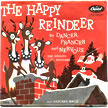 This December 1959 record was a fairly sappy attempt to cash in on the Chipmunks; the song itself is even a fairly transparent rewrite of "The Chipmunk Song." Another Chippers cop came from The Nutty Squirrels, who did several singles in that style including 1960's "Please Don't Take My Tree For Christmas." UPDATE: The Nutty Squirrels had "Nutty Noel" on the same single. The group was created by jazzers Sascha Burland and Don Elliot and they recorded three albums. Extra info and sleeve scan courtesy of Fred Clemens. (No live link from the album cover; couldn't find a reliable source for any of the songs mentioned in this post.)
This December 1959 record was a fairly sappy attempt to cash in on the Chipmunks; the song itself is even a fairly transparent rewrite of "The Chipmunk Song." Another Chippers cop came from The Nutty Squirrels, who did several singles in that style including 1960's "Please Don't Take My Tree For Christmas." UPDATE: The Nutty Squirrels had "Nutty Noel" on the same single. The group was created by jazzers Sascha Burland and Don Elliot and they recorded three albums. Extra info and sleeve scan courtesy of Fred Clemens. (No live link from the album cover; couldn't find a reliable source for any of the songs mentioned in this post.)
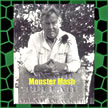 The deep-voiced Boris Karloff impersonator is best known for "Monster Mash," a 1962 smash that also returned to the charts in 1970 and 1973, according to Rock On. But when you make your bones with a Halloween song, it's perfectly logical that the sequel hit would be a Christmas tune. And so it was, just two months later, with Santa foiling the monsters' plan to destroy Christmas simply by giving them gifts. Speaking of sequel hits, you don't often see artists do songs that are so obviously based on their previous hits anymore -- I think the series of "Roxanne" rap tunes in the late 80s was the last time it happened, and that involved several different artists. Bobby's songs made it to wax with the help of Gary Paxton, who was involved with such acts as the Hollywood Argyles and Skip and Flip. Bobby maintained a career as a character actor and even saw his big hit transformed into a movie back in 1995, and he sequeled again in 2005 with "Climate Mash," a cautionary tale of global warming. You have to look a bit, but this does turn up on compilations from time to time. Pickett repaired to the crypt for good on April 25, 2007.
The deep-voiced Boris Karloff impersonator is best known for "Monster Mash," a 1962 smash that also returned to the charts in 1970 and 1973, according to Rock On. But when you make your bones with a Halloween song, it's perfectly logical that the sequel hit would be a Christmas tune. And so it was, just two months later, with Santa foiling the monsters' plan to destroy Christmas simply by giving them gifts. Speaking of sequel hits, you don't often see artists do songs that are so obviously based on their previous hits anymore -- I think the series of "Roxanne" rap tunes in the late 80s was the last time it happened, and that involved several different artists. Bobby's songs made it to wax with the help of Gary Paxton, who was involved with such acts as the Hollywood Argyles and Skip and Flip. Bobby maintained a career as a character actor and even saw his big hit transformed into a movie back in 1995, and he sequeled again in 2005 with "Climate Mash," a cautionary tale of global warming. You have to look a bit, but this does turn up on compilations from time to time. Pickett repaired to the crypt for good on April 25, 2007.
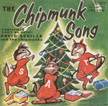 This 1958 record was the beginning of an entertainment dynasty; Chipmunks records and videos continue to be made even today. Like The Beatles' experiments with backward tapes on their records, the Chipmunks were the result of a happy accident, a tape played back at the wrong speed. The sound inspired Ross Bagdasarian to do a record that way, "Witch Doctor," released under the name David Seville. Later, he came up with the idea for The Chipmunks, starting with this holiday record. Several more hits followed; it's reputed that the Chipmunks kept Liberty Records from going out of business for many years. For many Baby Boomers, hearing this record is an indication that it's Christmas time. The original Chipmunks later did "Rudolph the Red-Nosed Reindeer," too, and in the Sixties they "jammed" with Canned Heat on "Christmas Blues," one of the more ludicrous pairings in the history of the record industry. UPDATE: Fred Clemons notes the original release of "The Chipmunk Song" is 1958, with the flip side being "Almost Good;" subsequent releases were backed with "Alvin's Harmonica," as was my 1959 copy. Also, he notes the artistic rendering of the 'Munks shown at left was replaced by the versions of Theodore, Simon and Alvin we're used to seeing in 1961.
This 1958 record was the beginning of an entertainment dynasty; Chipmunks records and videos continue to be made even today. Like The Beatles' experiments with backward tapes on their records, the Chipmunks were the result of a happy accident, a tape played back at the wrong speed. The sound inspired Ross Bagdasarian to do a record that way, "Witch Doctor," released under the name David Seville. Later, he came up with the idea for The Chipmunks, starting with this holiday record. Several more hits followed; it's reputed that the Chipmunks kept Liberty Records from going out of business for many years. For many Baby Boomers, hearing this record is an indication that it's Christmas time. The original Chipmunks later did "Rudolph the Red-Nosed Reindeer," too, and in the Sixties they "jammed" with Canned Heat on "Christmas Blues," one of the more ludicrous pairings in the history of the record industry. UPDATE: Fred Clemons notes the original release of "The Chipmunk Song" is 1958, with the flip side being "Almost Good;" subsequent releases were backed with "Alvin's Harmonica," as was my 1959 copy. Also, he notes the artistic rendering of the 'Munks shown at left was replaced by the versions of Theodore, Simon and Alvin we're used to seeing in 1961.
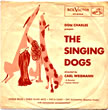 Dave Marsh and Steve Propes' book Merry Christmas Baby dates this record to 1955, but I thought it went back farther than that. Anyway, this record has become a Christmas classic. A fairly simple background track supports the sound of dogs barking the tune to the popular Christmas song. This was a lot harder to do in the 1950s than it is nowadays; it required hundreds of hours of recording barking dogs, putting the voices through a variable-speed oscillator to get the right pitches, then painstakingly editing the sounds into a song that fits in rhythm with the backing track. Today, you just sample half a dozen dogs into a computer and play it with a keyboard (see Jingle Cats). The creators didn't want their vision to be tied just to the holiday, though, so the B-side was "Oh Susanna." UPDATE: Fred Clemens confirms the original issue date of 1955 and notes the complete artist attribution should read "Don Charles presents The Singing Dogs directed by Carl Weismann." He also points out that the original issue had "Jingle Bells" in a medley with "Pat-A-Cake" and "Three Blind Mice," complete with a spoken introduction by a carnival barker, but was later, in 1971, edited down to just the familiar version, which itself was then re-edited to include an extra bridge and chorus. He also notes the following year (1956) the dogs, confirming that they were indeed nothing but hounds, issued "Hot Dog Rock 'n Roll" backed with "Hot Dog Boogie." Fred also sent us the cover scan of the original EP seen here.
Dave Marsh and Steve Propes' book Merry Christmas Baby dates this record to 1955, but I thought it went back farther than that. Anyway, this record has become a Christmas classic. A fairly simple background track supports the sound of dogs barking the tune to the popular Christmas song. This was a lot harder to do in the 1950s than it is nowadays; it required hundreds of hours of recording barking dogs, putting the voices through a variable-speed oscillator to get the right pitches, then painstakingly editing the sounds into a song that fits in rhythm with the backing track. Today, you just sample half a dozen dogs into a computer and play it with a keyboard (see Jingle Cats). The creators didn't want their vision to be tied just to the holiday, though, so the B-side was "Oh Susanna." UPDATE: Fred Clemens confirms the original issue date of 1955 and notes the complete artist attribution should read "Don Charles presents The Singing Dogs directed by Carl Weismann." He also points out that the original issue had "Jingle Bells" in a medley with "Pat-A-Cake" and "Three Blind Mice," complete with a spoken introduction by a carnival barker, but was later, in 1971, edited down to just the familiar version, which itself was then re-edited to include an extra bridge and chorus. He also notes the following year (1956) the dogs, confirming that they were indeed nothing but hounds, issued "Hot Dog Rock 'n Roll" backed with "Hot Dog Boogie." Fred also sent us the cover scan of the original EP seen here.
